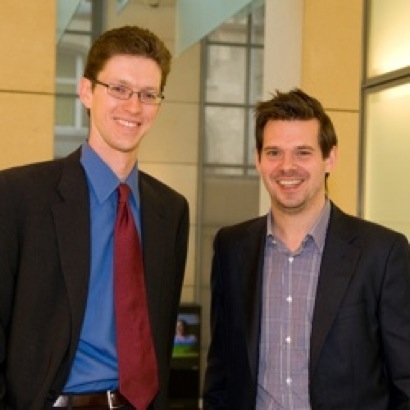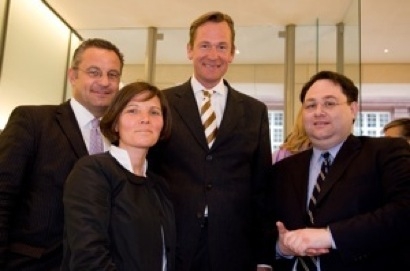
Burns Award winners Andrew Curry (2003) and Gregor Peter Schmitz (1997) at the June alumni dinner in Berlin.

From left: Frank-Dieter Freiling, Burns trustee and coordinator; Martina Johns, Burns alumna, IJP director and coordinator for the Asia fellowships; Mathias Döpfner, Burns alumnus and CEO of Axel Springer; and IJP director Vassilios Theodossiou, coordinator for Northern Europe fellowships.
The 2008 Burns and Kennan Award winners focus on the hopes of the African-American civil rights movement with Barack Obama's historic election; on Germany's struggle with releasing Stasi police secrets; and on an American identity crisis displayed in its new embassy building in Berlin.

Burns Award winners Andrew Curry (2003) and Gregor Peter Schmitz (1997) at the June alumni dinner in Berlin.
Andrew Curry (Burns 2003), who currently freelances from Berlin, won the U.S. Burns Award for "Piecing together the dark legacy of East Germany's secret police," published in the February 2008 edition of Wired magazine. Considering that Curry's article on Germany's Stasi past is a marginal issue for U.S. readers, the fact that the magazine printed this considerably long story in its entirety is impressive. This is due to Curry's dramatic writing, which artfully explains the tedious puzzle work of regenerating the Stasi files, while relating the personal story of an employee of the agency in charge of the files. The jury felt that Curry covered this difficult topic in an entertaining and captivating way without losing focus on the story's depth or significance.
The two 2,000-Euro prizes are awarded by Germany's Foreign Minister. Both Curry and Schmitz received their honors at the annual Burns alumni dinner and lecture on June 4 in Berlin.

Burns Award winners Andrew Curry (2003) and Gregor Peter Schmitz (1997) at the June alumni dinner in Berlin.
The 2,000-Euro George F. Kennan Commentary Award went to Niklas Maak, Berlin correspondent for Frankfurter Allgemeine Sonntagszeitung, for his story "Die Botschaft der Botschaft (The Message of the Embassy)," published on April 20, 2008. In a year with no lack of commentary about the outgoing and incoming U.S. president, Maak managed to describe an American identity crisis in his unusual architectural critique of the new U.S. embassy in Berlin. "If a house could stand with crossed arms, this is what it would look like," Maak wrote of the new fortress-style building at Pariser Platz in Berlin Mitte. "The embassy is the picture of a country traumatized by 9/11 and the effects of globalization; a nation that is so armored up, it can no longer see the world."
The jury also gave an honorary mention to Süddeutsche Zeitung correspondent Nikolaus Piper for his commentary piece "Wendejahr 2008 (Year of Change 2008)," published on December 31, 2008. The jury credited Piper's work for its outstanding analysis and foresight, as he tied economic politics to world politics.
The jury for both awards was comprised of journalists Sabine Christiansen, Dr. Christoph von Marschall (Tagesspiegel), Claus Strunz (Hamburger Abendblatt), Florian Illies (Die Zeit/Monopol) and Dr. Dominik Wichmann (Süddeutsche Zeitung), as well as Dr. Frank-Dieter Freiling (ZDF) and Martina Nibbeling-Wriessnig (Foreign Ministry of Germany).
2007 Burns Award Winners
2006 Burns Award Winners
2005 Burns Award Winners
2004 Burns Award Winners
2003 Burns Award Winners
2002 Burns Award Winners